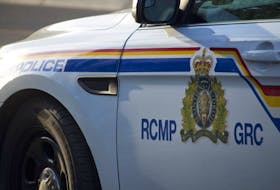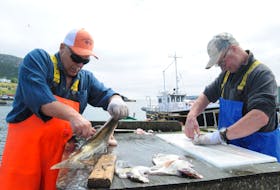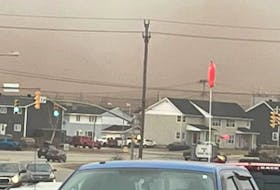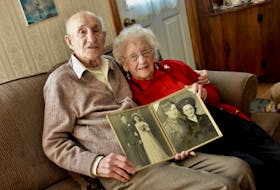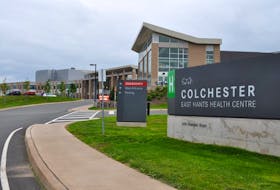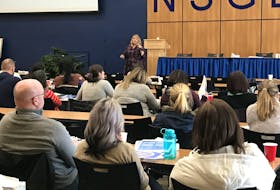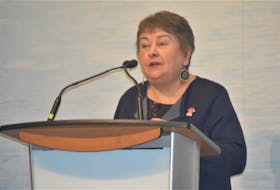Mandatory in-person exams for resident doctors in the Atlantic region remain a go despite concerns by some of those residents that such gatherings could increase the risk of spreading the coronavirus during a time when cases are rising in other parts of Canada.
However, the Medical Council of Canada has in the last few days already cancelled exam sites for Kingston, Ont. and Montreal, Que.
The examination body “has not acknowledged the fact that this has potential for great harm especially in locations where people are travelling from hot spots or coming from the US for the exam,” said one resident doctor from Halifax.
The exam, known as the Qualifying Examination Part II and delivered by the Medical Council of Canada, is scheduled at various sites across the country, including Halifax and St. John’s, Oct. 24 and 25. It had been postponed since May due to pandemic restrictions.
This exam, among others, is required by provincial licensing bodies in order for new doctors to be able to practice independently. (Resident doctors are physicians who have completed medical school and now completing specialty training before independent practice, such as family medicine or a surgical specialty.)
While this particular exam typically involves residents participating in scenarios with actors playing the roles of patients, the modifications mean residents will not be performing physical examinations and are instructed to avoid touching anyone in any way. Residents and others at the examination site will also be instructed to wear masks and sanitize at each station, and there will be staggered start and end times to avoid congestion.
In a statement, Dr. Maureen Topps, executive director and chief executive officer of the MCC, said the examining body is classified as an essential service, and its goal is to continue delivery of the materials required to support physicians as they enter full independent practice, in as timely and as safe a manner as possible.
“We have worked to make the changes necessary to reduce the possible risks during the delivery of the MCCQE Part II with physical distancing and other personal protective measures in place at each examination centre, as per the guidelines set by local public health authorities,” Topps said.
“We believe that the potential for travel-related viral transmission is very high, and higher still in the context of a second wave."
Not enough precautions?
But some residents across the country and in the Atlantic region say it’s not enough. A Facebook group, entitled Resident Physicians of Canada Campaigning to Eliminate the MCCQE Part II, has attempted to pressure the MCC to cancel the exam until the pandemic is under control, especially in provinces such as Ontario and Quebec, where case numbers have greatly increased.
“We do not have quantitative data available to us,” the spokespeople of the Facebook group acknowledged, “but based on previous exams, it is highly likely that the number of individuals in these indoor spaces, as well as their ability to physically distance, will violate current public health recommendations and municipal/provincial laws.”
The group also points out many residents will need to travel to get to their exam site, and they have not been instructed, or in some cases, permitted, by their home university to isolate for 14 days before and after the exam. The MCC hasn’t offered any alternatives to in-person examination.
“We believe that the potential for travel-related viral transmission is very high, and higher still in the context of a second wave,” the group spokespeople said.
The residents group also charged that the cancelled Kingston exam included not only candidates from hot spots in Ontario but residents from the United States as well.
A spokesperson from the MCC said no American residents are slated to write the exams at the Halifax and St. John’s sites. Out of the 133 candidates attending those two sites, 11 have addresses on file from outside the Atlantic bubble. But she emphasized that due to the often-transient nature of residents, those addresses are not necessarily accurate or up to date.
Resident doctors worried
Resident doctors would only speak to the Saltwire Network anonymously, as they fear repercussions involving future employment opportunities if they decide to defer the exam. One resident, from Halifax, noted that Toronto was to be her original testing site until organizers changed the location to Halifax.
“If I was still in Toronto, I’d be adamant that it should not go through,” the resident said.
But while being able to remain in an area with few active cases is a relief to her, the resident doctor says there is still a risk of spreading the virus even within the Atlantic bubble. She pointed towards growing number of cases in New Brunswick – including a Moncton nursing home - as a major area of concern.
“The risk for spreading is high considering many of us deal with vulnerable populations,” she said.
“As physicians, we have stopped meetings in person, stopped conferences, and decreased in-person visits - all to decrease risk of getting COVID-19 and then spreading it to our vulnerable population and those who might not have risk factors but have people at home who do.”
She says it’s unfortunate the MCC won’t cancel this exam and she doesn’t like the potential consequences of writing an in-person exam.
“I’m also working, have kids in school and daycare, so what happens if I get symptoms and need to isolate? I need this test to get my full license.”
Another resident, formerly from Halifax, but now based in Ottawa, says: “I, personally, would like to see the exam cancelled until things are more under control, especially with cases so high here in Ontario.”
But in her case, she wouldn’t be able to write her exam this month even if she wanted to, as the MCC told her there was no room at any of its testing sites.
“My understanding is that they are dealing with the backlog of candidates from the cancellation of the spring exams,” she said. “It’s tough, though, because some people are at the end or almost at the end of their residency and do not have a spot to write their exam.”
“This exam is a relic from the days where you could graduate medical school and then be a general practitioner.
Since it’s not possible to do that anymore, many people have questioned the value of this exam.”
Unnecessary test?
The resident, like many others, also believes the exam itself has outlived its purpose. She said that despite the fact the MCC exam is a requirement in most provinces for new doctors, the exam is redundant for many, especially for those who are entering one of the various specialties. It is also costly at roughly $3,000 per candidate, who generally have high debt loads at this point in their training.
“Every program has its own [licensing] test at the end, which is much more comprehensive and specific to the program they are in,” the resident said. “(The MCC exam) has also changed over the years and is now very similar to the oral exam family medicine doctors have at the end of their training, so why do we have to do the same thing twice?
“This exam is a relic from the days where you could graduate medical school and then be a general practitioner. Since it’s not possible to do that anymore, many people have questioned the value of this exam.”
Organizations that represent resident doctors have expressed concern about the MCC exam specifically. A statement from Dr. Esther Kim, the president of the Resident Doctors of Canada, noted that over 800 residents gave “raw and unfettered” responses to the association’s call for comments regarding the QEII exam.
Kim said she has received assurance from MCC that it will continue to provide a safe exam experience, and that it has a “liberal refund policy” in place during the pandemic. She has also received confirmation from all medical licensing authorities that they will extend provisional licenses for any candidate who does not participate in the MCC exam.
“During the pandemic, Resident Doctors of Canada has held fast to two guiding principles related to all examinations,” Kim’s statement said. “First – we believe that the safety of the candidate is paramount. Second – we believe that no one’s ability to enter practice should be impeded due to the pandemic.”
Sandi Carew, chief executive officer of Maritime Resident Doctors, said only one local resident has asked her about the subject of the MCC exam.
“I think it may be a bigger issue in the other provinces, where there are no travel restrictions. I highly doubt someone would choose to come do the exam here knowing they have to arrive two weeks early to self-isolate,” Carew said. “Residency is too busy for that.”
The health departments of both Nova Scotia and Newfoundland and Labrador were contacted regarding the MCC exam, but no response was received by press time.


